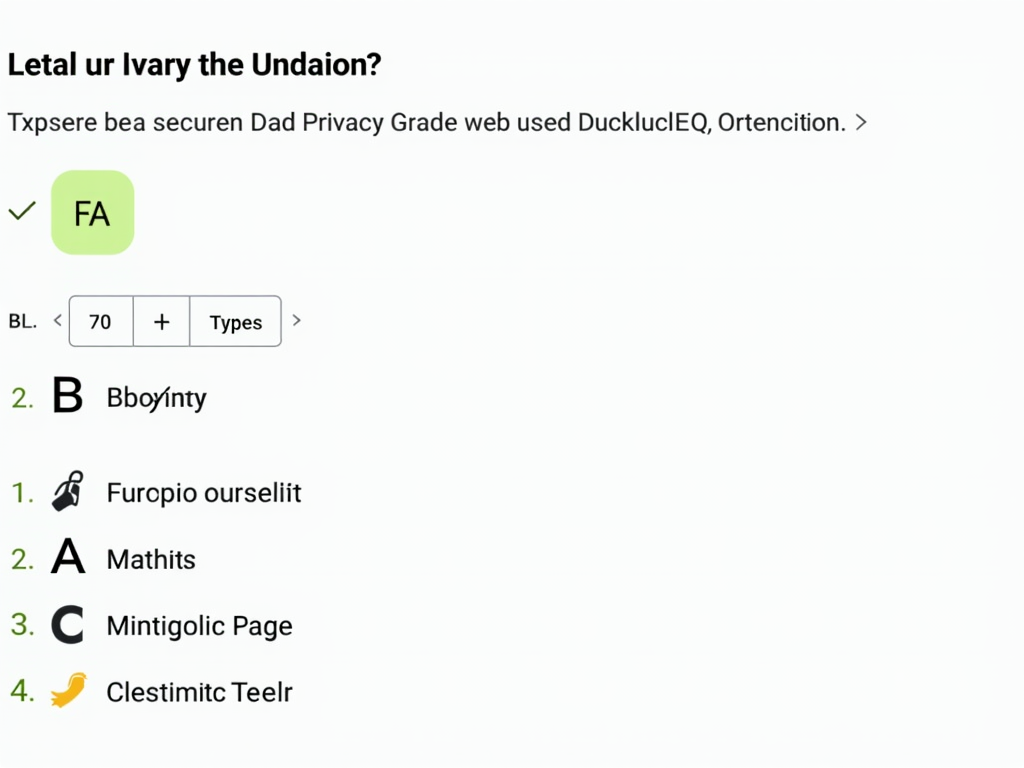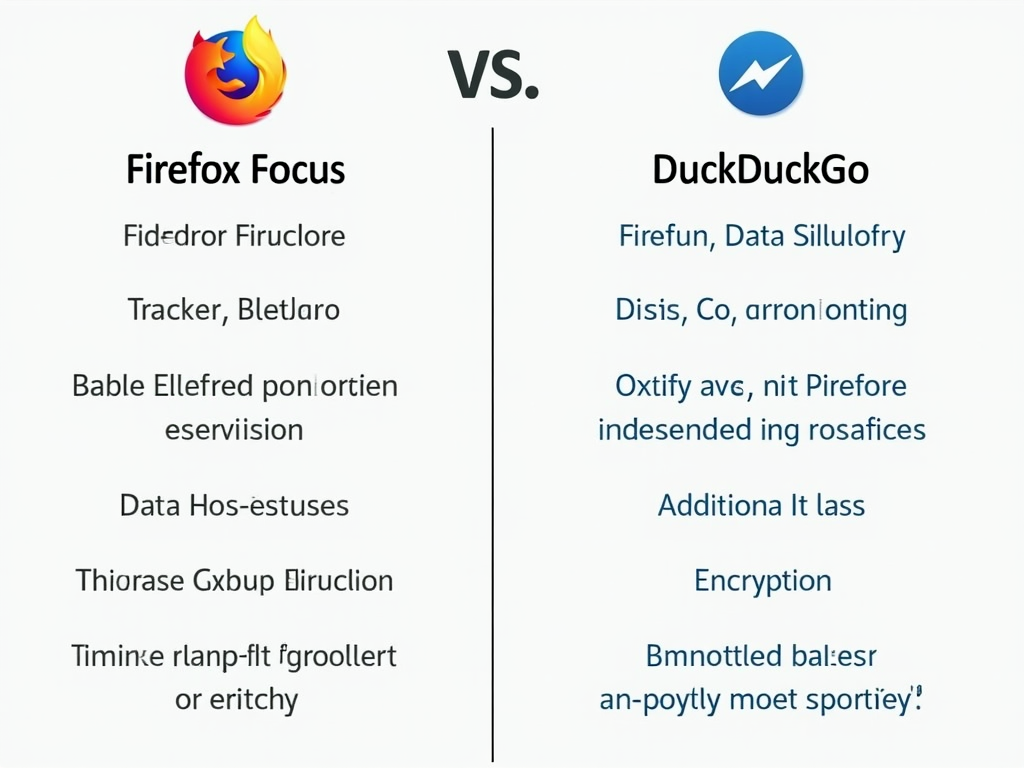Firefox Focus vs DuckDuckGo: Which Mobile Browser is More Private?
In today's digital age, online privacy has become a growing concern for many internet users. With data breaches, targeted advertising, and invasive tracking becoming more prevalent, choosing the right tools to protect your personal information is crucial. Two popular options for privacy-conscious mobile users are Firefox Focus and DuckDuckGo. Both promise enhanced privacy features, but which one truly offers better protection? In this article, we'll take a deep dive into Firefox Focus vs DuckDuckGo, comparing their privacy features, user experience, and overall effectiveness in safeguarding your data.

Overview of Firefox Focus and DuckDuckGo
Firefox Focus is a privacy-centric mobile browser developed by Mozilla. It's designed to be a lightweight, fast, and secure browsing option that automatically blocks a wide range of online trackers, including social media trackers, analytics, and advertising trackers. With a single tap, users can erase their browsing history, passwords, and cookies, ensuring that no trace of their online activity is left behind.
DuckDuckGo, primarily known for its privacy-focused search engine, also offers a mobile browser app. Like Firefox Focus, DuckDuckGo's browser blocks trackers and enforces encryption when possible. Additionally, it provides a unique feature called "Privacy Grade," which rates websites based on how well they protect user privacy. This allows users to make informed decisions about the sites they visit.
Privacy Features Comparison
When it comes to privacy, both browsers take a strong stance, but their approaches differ slightly.
- Tracker Blocking:
- Firefox Focus uses Mozilla's own tracking protection technology to block a broad spectrum of trackers by default. It also allows users to customize which types of trackers to block, offering more control over their browsing experience.
-
DuckDuckGo's browser leverages its search engine's privacy expertise to block trackers. It uses a combination of its own tracker lists and third-party sources to identify and block tracking scripts.
-
Data Erasure:
- Firefox Focus makes it incredibly easy to erase all browsing data with a single tap. This includes history, cookies, and passwords, ensuring that no personal information is stored on the device.
-
DuckDuckGo offers a similar feature with its "Fire" button, which instantly closes all tabs and clears browsing data. However, it also provides an option to save certain data, like bookmarks, for users who want a balance between privacy and convenience.
-
Encryption:
-
Both browsers prioritize secure connections. Firefox Focus automatically upgrades connections to HTTPS when available, while DuckDuckGo's "Smarter Encryption" feature forces sites to use encrypted connections whenever possible.
-
Privacy Grading:
- DuckDuckGo stands out with its Privacy Grade feature, which assigns a letter grade (A to F) to each website based on its privacy practices. This helps users understand the level of privacy protection offered by the sites they visit.
Based on these features, both browsers offer robust privacy protections, but DuckDuckGo's Privacy Grade provides an extra layer of transparency that Firefox Focus lacks.

User Experience and Interface
Privacy is important, but so is usability. A browser that's difficult to navigate or lacks essential features may not be practical for everyday use.
- Firefox Focus:
- The interface is minimalist and designed for quick, distraction-free browsing. It opens directly to a search bar, and there are no tabs or bookmarks, emphasizing its use for short, private sessions.
-
This simplicity can be a double-edged sword. While it reduces clutter, it may not be suitable for users who need to manage multiple tabs or save bookmarks.
-
DuckDuckGo:
- DuckDuckGo's browser offers a more traditional browsing experience with tabs and bookmarks, making it easier for users to switch from other browsers.
- The "Fire" button is a standout feature, allowing users to quickly clear all data without leaving the app.
For users who prioritize privacy above all else and don't mind the limitations, Firefox Focus's stripped-down interface may be appealing. However, DuckDuckGo offers a better balance between privacy and functionality for those who need a more versatile browser.
Performance and Compatibility
Privacy features can sometimes impact browsing performance or website functionality. It's important to consider how these browsers handle these trade-offs.
- Firefox Focus:
- By blocking trackers and ads, Firefox Focus can load pages faster and use less data. However, some websites may not function properly if essential scripts are blocked.
-
Users can temporarily disable tracking protection for specific sites if needed, but this requires manual intervention.
-
DuckDuckGo:
- Similarly, DuckDuckGo's tracker blocking can speed up page loads and reduce data usage. Its Privacy Grade feature also helps users identify sites that may be problematic.
- DuckDuckGo allows users to adjust privacy settings on a per-site basis, offering more flexibility without completely disabling protection.
Both browsers strike a good balance between privacy and performance, but DuckDuckGo's granular controls may give it a slight edge for users who frequently encounter compatibility issues.

Additional Privacy Tools
Beyond their core browsing features, both Firefox Focus and DuckDuckGo offer additional tools to enhance privacy.
- Firefox Focus:
- Integrates with Mozilla's VPN service (available separately), providing an extra layer of security for users who want to encrypt their entire internet connection.
-
Offers a "Stealth" mode that prevents screenshots and hides the browser from the app switcher, adding an extra layer of privacy.
-
DuckDuckGo:
- Provides a built-in email protection feature that strips trackers from incoming emails.
- Offers a "Global Privacy Control" setting that signals to websites not to sell or share user data, although its effectiveness depends on website compliance.
These additional features make both browsers more than just private browsing tools, offering comprehensive privacy solutions for mobile users.
Which Browser is More Private?
Determining which browser is more private depends on your specific needs and browsing habits.
- For Maximum Privacy:
-
Firefox Focus's aggressive tracker blocking and automatic data erasure make it ideal for users who want the highest level of privacy for short browsing sessions. Its integration with Mozilla's VPN also provides an extra layer of security.
-
For Balanced Privacy and Usability:
- DuckDuckGo offers strong privacy protections while maintaining a more traditional browsing experience. Its Privacy Grade feature and additional tools like email protection make it a versatile choice for users who want privacy without sacrificing functionality.
Ultimately, both browsers are excellent choices for privacy-conscious users, and the best option depends on your personal preferences and how you use your mobile device.

Conclusion
In the battle of Firefox Focus vs DuckDuckGo, both browsers offer robust privacy features that can help protect your data when using online tools. Firefox Focus excels in providing a minimalist, highly private browsing experience, while DuckDuckGo offers a more feature-rich browser with unique tools like Privacy Grade and email protection.
If you're looking for a browser that prioritizes privacy above all else and don't mind a stripped-down interface, Firefox Focus may be the better choice. However, if you want a balance between privacy and usability, with additional features to enhance your overall online privacy, DuckDuckGo is likely the superior option.
Regardless of which browser you choose, using either of these tools is a significant step towards protecting your personal information in an increasingly data-driven world.